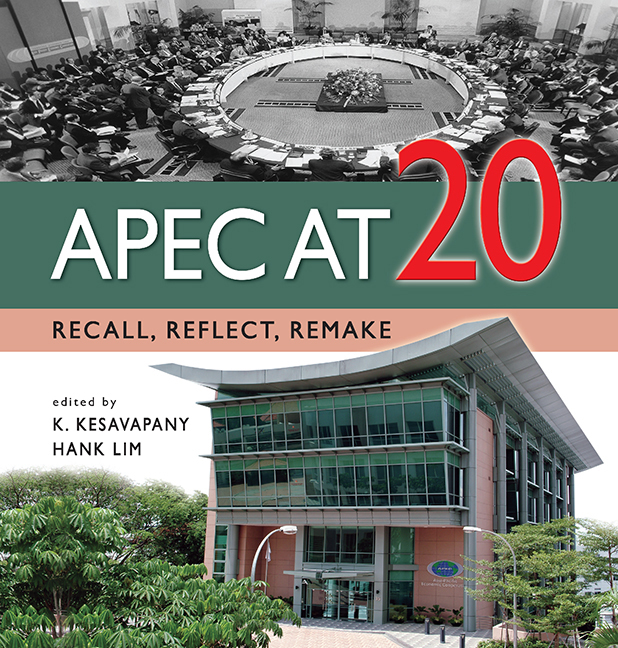Book contents
- Frontmatter
- Frontispiece
- contents
- Foreword by Ambassador Michael Tay
- Preface
- About the Authors
- Asia-Pacific Economic Cooperation (APEC)
- CHAPTER 1 APEC: Genesis and Challenges
- CHAPTER 2 APEC's Origins and its Future
- CHAPTER 3 Four Adjectives Become a Noun: APEC The Future of Asia-Pacific Cooperation
- CHAPTER 4 APEC's Eye on the Prize: Participants, Modality, and Confidence-Building
- CHAPTER 5 APEC: Taking Stock and Looking Ahead
- CHAPTER 6 Revamping APEC's Concerted Unilateral Liberalization
- CHAPTER 7 APEC at 20: Assessment of Trade/Investment Liberalization, Facilitation and Ecotech Activities
- CHAPTER 8 Integrating the Business Community in the APEC Process: Genesis of the Pacific Business Forum
- APPENDICES
- Index
CHAPTER 4 - APEC's Eye on the Prize: Participants, Modality, and Confidence-Building
from Asia-Pacific Economic Cooperation (APEC)
Published online by Cambridge University Press: 21 October 2015
- Frontmatter
- Frontispiece
- contents
- Foreword by Ambassador Michael Tay
- Preface
- About the Authors
- Asia-Pacific Economic Cooperation (APEC)
- CHAPTER 1 APEC: Genesis and Challenges
- CHAPTER 2 APEC's Origins and its Future
- CHAPTER 3 Four Adjectives Become a Noun: APEC The Future of Asia-Pacific Cooperation
- CHAPTER 4 APEC's Eye on the Prize: Participants, Modality, and Confidence-Building
- CHAPTER 5 APEC: Taking Stock and Looking Ahead
- CHAPTER 6 Revamping APEC's Concerted Unilateral Liberalization
- CHAPTER 7 APEC at 20: Assessment of Trade/Investment Liberalization, Facilitation and Ecotech Activities
- CHAPTER 8 Integrating the Business Community in the APEC Process: Genesis of the Pacific Business Forum
- APPENDICES
- Index
Summary
In commemoration of those who have been treading through the APEC paths with devotion to a better future during the past two decades, this chapter assesses APEC's future prospects by highlighting the past aspirations as well as unexpected setbacks. The scope of this chapter will mainly focus on the following three dimensions that are manifested in some personality theory, philosophical underpinning, organizational theory, system theory, and management theory:
(1) Participants: Distinction will be made between liberal/idealists, realists, and constructivists and their respective impacts on unilateralism, multilateralism, and constructivism.
(2) Modality: The APEC modus operandi will be explored by contrasting two key conceptualizing principles, namely “concerted unilateralism” vis-à-vis “competitive liberalization”.
(3) APEC as an Institution in the Geopolitical Dynamics: The structure and functions of APEC as an institution, particularly in the context of geopolitical dynamics, such as the challenge of WTO negotiations, the Asian financial crisis, and the 9/11 terrorists attack on the World Trade Center at New York City in 2001.
APEC Participants: Various Levels of Expectation, Satisfaction, Trust, and Comfort
In the assessment of APEC achievements and setbacks, APEC participants as a significant factor cannot be underestimated. For the sake of illustration, three contrasting types of people stand out in the APEC corridors: one bears the liberal/idealist's temperament, another wears the realist's jacket, by choice or at others’ command, and still another strives to be the constructivist in pursuit of common interests. Many sit or swing somewhere in between these three typologies with issue-specific and timebound circumstances.
The liberal/idealists attend APEC meetings in good faith. They believe that cooperation is possible, and see laws as one of the major instruments for framing and maintaining good order in the international system. The realists believe in the roles of deterrence and balance of power in global governance more than international organizations per se, and consider APEC as a useful locus for function-specific targets, and with the aspiration to manoeuvre policy directions, stage power plays, and at times bully when timely, or impose isolation against others where necessary.
- Type
- Chapter
- Information
- APEC at 20Recall, Reflect, Remake, pp. 41 - 56Publisher: ISEAS–Yusof Ishak InstitutePrint publication year: 2009



